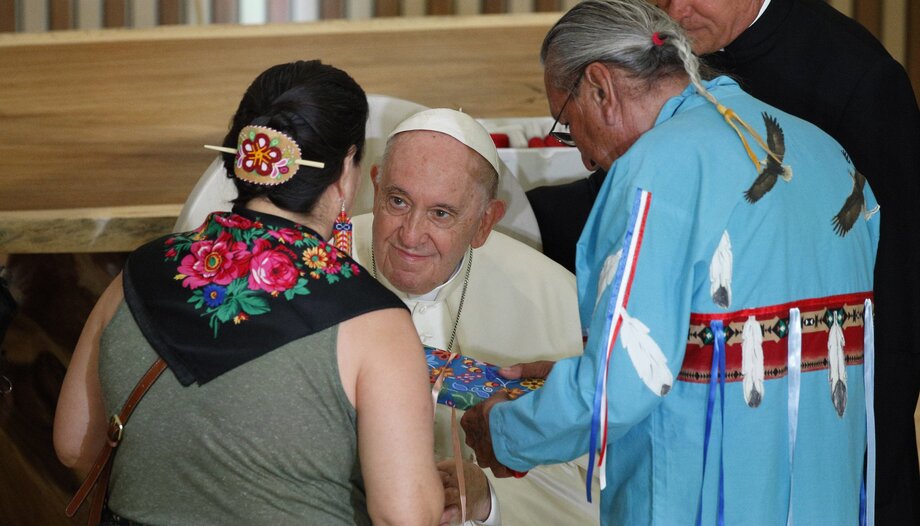









On March 30, 2023, at noon, a joint note was made public from the Dicastery for Culture and Education and the Dicastery for the Service of Integral Human Development. The paper deals with the abuses suffered by indigenous peoples in the name of discovery. This document comes eight months after Pope Francis' visit to Canada, in which he publicly condemned the colonizing mentality.
Francis was not the first to speak out against the abuses of colonization. As the communiqué states, "in the course of history, Popes have condemned acts of violence, oppression, social injustice and slavery, including those committed against indigenous peoples. There have been numerous examples of bishops, priests, men and women religious and lay faithful who have given their lives in defense of the dignity of these peoples".
However, admitting this also implies respecting the true historical facts and "demands the recognition of human weakness and the failures of Christ's disciples in every generation. Many Christians have committed acts of evil against indigenous populations".
The result of a dialogue
To deal with all this, the Church initiated a dialogue with members of the indigenous peoples and, as a result, "has seen the importance of confronting the concept called 'doctrine of discovery'". The very term of discovery is a source of debate as to its meaning, since in the legal sphere, "the discovery of land by settlers granted the exclusive right to extinguish, by purchase or conquest, the title or possession of such land by the indigenous populations."
In the centuries of the great explorations, this "doctrine" was born, supposedly supported by some papal bulls, such as "Dum Diversas" (1452), "Romanus Pontifex" (1455) and "Inter Caetera" (1493). However, the joint note of the dicasteries states that "the "doctrine of discovery" is not part of the teaching of the Catholic Church. Historical research clearly demonstrates that the papal documents in question, written in a specific historical period and related to political issues, have never been considered expressions of the Catholic faith".
Despite this, it is also true, as the brief states, that those papal bulls "did not adequately reflect the equal dignity and rights of indigenous peoples" and, at times, political powers manipulated their content in order to justify abuses against indigenous people. Consequently, "it is right to acknowledge these errors, to recognize the terrible effects of assimilation policies and the pain experienced by indigenous populations, and to ask for forgiveness. Furthermore, Pope Francis has exhorted: "May the Christian community never again allow itself to be contaminated by the idea that there is a culture superior to others and that it is legitimate to use means of coercion against others".
Respect for every human being
What does form part of the teaching of the Catholic Church is "the respect due to every human being. Therefore, the Catholic Church repudiates concepts that do not recognize the intrinsic human rights of indigenous peoples, including what has become known legally and politically as the 'doctrine of discovery'".
Various Church documents have sought to protect the rights of indigenous people throughout history. Recently, this objective has been reinforced by the Holy See's "strong support for the principles contained in the United Nations Declaration on the Rights of Indigenous Peoples. The implementation of such principles would improve living conditions and help protect the rights of indigenous peoples, as well as facilitate their development in a way that respects their identity, language and culture".
The art of reconciliation
Cardinal José Tolentino de Mendonça, Prefect of the Dicastery for Culture and Education, commented on the published note. It is part of what we could call the architecture of reconciliation, and also the product of the art of reconciliation," he said. reconciliationThe process through which people commit to listen to each other, to talk to each other and to grow in mutual understanding".
The dialogue that the Church maintains with the indigenous peoples allows us to understand the sufferings and errors committed. These conversations show the interest of the People of God to engage in the search for reconciliation and in the art of encounter.
Avenues for dialogue
For its part, the Canadian Conference of Catholic Bishops has expressed its appreciation for the promulgated note and has informed that it is working to open new avenues for dialogue. So much so that the bishops are studying the possibility of organizing a symposium together with the Pontifical Committee for Historical Sciences with indigenous and non-indigenous academics.
The aim of the academic meeting is to deepen the historical understanding of the doctrine of discovery. The two dicasteries in charge of the note have expressed their support for this initiative. The U.S. Conference of Catholic Bishops has also shown interest in the symposium, as Archbishop Paul S. Coakley, secretary of the Conference, said in a statement.












